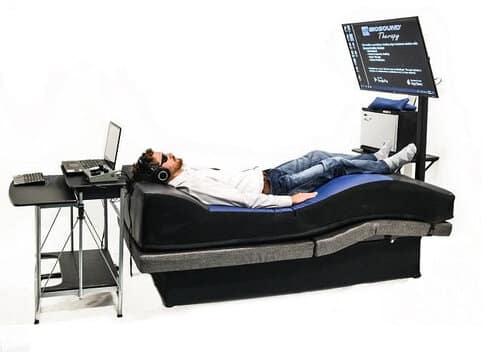Request a Callback
"*" indicates required fields
EMDR
Have you been struggling with troubling memories or emotions? The good news is there’s an innovative therapy that can help reprocess traumatic experiences and find inner peace.
Eye Movement Desensitization and Reprocessing (EMDR) is a nontraditional psychotherapy treatment that can help you heal from distressing life events in a short period of time.
Originally developed to treat post-traumatic stress disorder, EMDR has been found effective for a range of conditions like addiction, anxiety, and depression.
What Is EMDR Therapy?
EMDR therapy is a form of psychotherapy that can help change the way your brain responds to traumatic or distressing experiences. During EMDR, you recall traumatic events while your therapist directs your eye movements (or uses alternate techniques like taps). This helps your brain process the memory in a new, less painful way.
EMDR incorporates elements of cognitive-behavioral therapy with eye movements or other forms of rhythmic, left-right stimulation that can unlock connections in the brain and help facilitate healing.
The goal of EMDR is to process completely the experiences that are causing problems, and to include new ones that are needed for healthy functioning.
Benefits of EMDR
EMDR therapy can be incredibly effective for addiction and mental health treatment. Here are some of the main benefits:
- Reduced Symptoms and Distress
- Healthier Beliefs and Coping Skills
- Improved relationships
- Lasting Change
EMDR offers a kind of healing that gets to the root cause of suffering. If you’re struggling with addiction or mental health issues, it could be the key to overcoming your past and creating a healthier future.


Areas where EMDR is used
EMDR is used to treat a wide range of mental health and addiction issues. Some of the areas where EMDR can be particularly helpful include:
- PTSD and trauma
- Addiction
- Anxiety and panic disorders
- Depression
- Self-esteem issues
EMDR has been used successfully to treat a variety of conditions involving traumatic or distressing memories and negative beliefs.
How EMDR Works to Treat Trauma and Addiction
EMDR works by stimulating the brain’s information processing system through eye movements, sounds or taps. This helps the brain unblock traumatic memories and reprocess them in a healthy way.
When addictions form, the mind relies on the addictive behavior or substance to cope with emotional distress or trauma. EMDR works to identify these root causes and reframe negative thoughts and beliefs. By reprocessing traumatic memories that fuel the addiction, EMDR can help eliminate triggers and cravings.
EMDR sessions involve recalling distressing events while moving your eyes back and forth, following the therapist’s fingers or a light. This helps your brain access and reframe the trauma memory.
The eye movements also stimulate the brain’s ability to forge new neural connections. Over multiple sessions, the traumatic memories lose their power and negative thoughts shift to more positive, healthy ones.
When talk therapy or medication alone is not enough, EMDR may provide the breakthrough that leads to overcoming trauma, changing unhealthy patterns and maintaining long- term wellness.
The 8 Phases of EMDR Treatment
- In Phase 1, your therapist will evaluate whether EMDR is right for you and help prepare you for treatment.
- In Phase 2, you’ll identify a specific traumatic memory to target, like an event from your past that’s particularly painful or distressing. Your therapist will help determine what negative beliefs you hold about yourself in relation to this memory.
- Phase 3 involves desensitizing yourself to that traumatic memory through bilateral stimulation, like eye movements, taps, or tones. This helps to unlock the memory so you can process the emotions around it.
- In Phase 4, you’ll focus on the memory and your physical sensations, emotions, and beliefs about yourself. Your therapist will guide you through this process and help you move through the difficult emotions.
- Phase 5 involves installing positive thoughts and beliefs about yourself to replace the negative ones you identified in Phase 2. You’ll repeat the bilateral stimulation to strengthen those positive beliefs.
- In Phase 6, you’ll focus on the original traumatic memory again to check that it’s no longer distressing. If it still elicits strong emotions, you’ll repeat the process.
- Phase 7 helps ensure the progress made during treatment is holding. You’ll discuss any insights or connections you’ve made between the targeted memory and your addiction or mental health issues.
- Finally, Phase 8 involves reevaluating your treatment and preparing for the future.


We believe in Holistic Therapies.

Biosound Therapy
Biosound Therapy is the integration of Biofeedback, Therapeutic Music, sound healing massage, and guided imagery. The guided imagery selections on the Biofeedback Bed are designed to address the guilt, fear, shame and trauma associated as underlying issues for most dealing with addiction. These moving meditations begin with a journey to a completely relaxed state of mind. Then, utilizing a unique echo effect, powerful and positive affirmations are delivered. This combination helps the client overcome those deep rooted, negative patterns of thought and behavior.
- Relieves pain & stress
- Assists with Detoxification Treatment
- Lowers cravings, impulse behavior and racing thoughts
- Lowers anxiety & depression

Equine Psychotherapy
Equine-Assisted Therapy is used to treat patients challenged with everything from drug and alcohol abuse dependency and post-traumatic stress syndrome. The therapy takes advantage of the mental and physical exercise that working with a horse can provide. Equine therapy:
- Helps clients learn to identify and cope with feelings
- Promotes Effective Communication Skills
- Helps Addicts Better Manage Behavior
- Teaches How to Set Boundaries
- Restores Self-Esteem and Self-Worth
*This is an optional, additional therapeutic therapy available after clinical treatment hours.

Massage Therapy
Clients at Relevance receive weekly massage therapy from our Licensed Therapists. Some additional benefits include:
- Release of ‘feel-good’ hormones. According to the American Massage Therapy Association (AMTA), massage helps to increase serotonin and dopamine (feel-good hormones) and decrease cortisol which is related to stress.
- Reduce agitation and anxiety and ease sleep problems.
- Provides a natural, alternative method of healing, free of drugs.
- Helps with the removal of metabolic waste. Therapeutic massage triggers or stimulates the body’s parasympathetic nervous system. This in turn can increase circulation and promote the effectiveness of the lymph system. The lymph system helps to alleviate pain symptoms and is responsible for removing the body’s metabolic waste build-up.
- Provides the client with a connection to their body, and improves or increases body awareness.
EMDR for PTSD and Other Mental Health Conditions
- Addiction
- Depression and anxiety
- Eating disorders
- Chronic pain
Does EMDR Really Work? The Research on Effectiveness
EMDR has been studied extensively in clinical trials and shown to be effective. Over 100 randomized studies have found EMDR to be effective for PTSD, anxiety, depression, and other issues.
Does it really work? The research says yes. EMDR has been designated as an effective treatment for PTSD by the American Psychiatric Association, the International Society for Traumatic Stress Studies, and the US Department of Veterans Affairs and Defense. Studies show at least 80% of people experience significant decreases in PTSD symptoms after 3-6 EMDR sessions.
How does it work so quickly? EMDR is thought to work by unlocking negative patterns of emotions, thoughts, and body sensations associated with traumatic memories, then reprocessing them into more positive, healthy associations.


Get the Help You Need, Now.
Start your journey to substance abuse recovery with us in New Jersey today.




